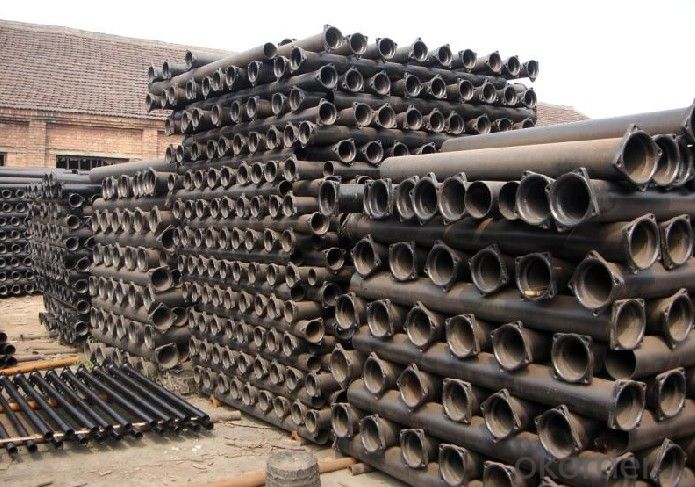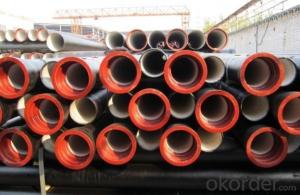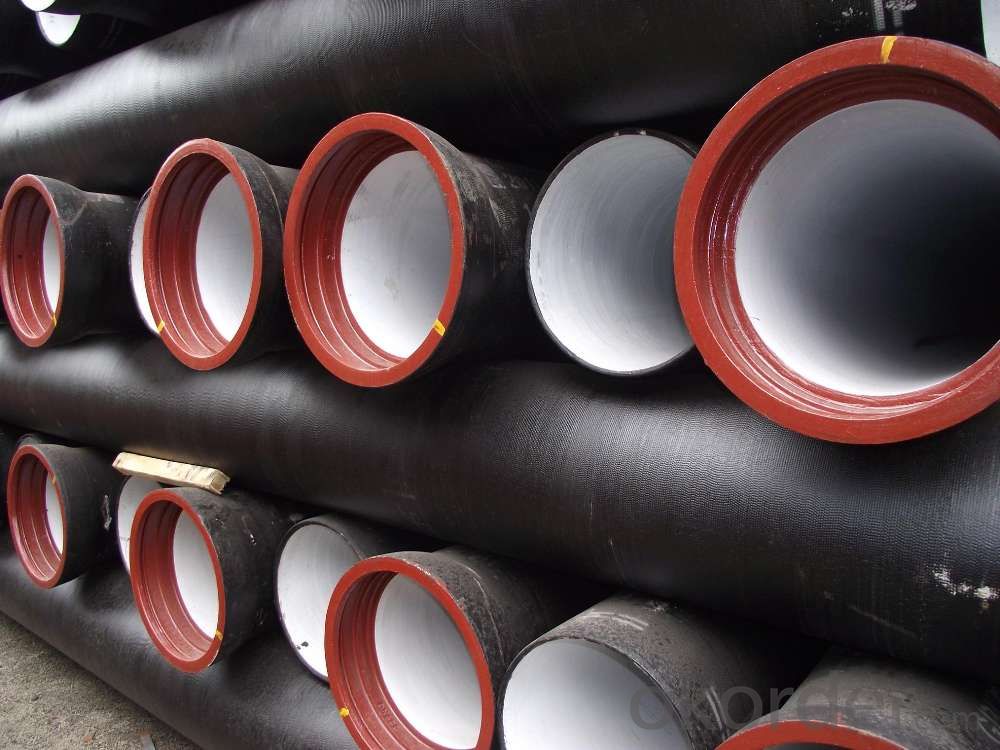Ductile Iron Pipe High Quality ISO2531:1998 DN80
- Loading Port:
- China main port
- Payment Terms:
- TT OR LC
- Min Order Qty:
- 999 m
- Supply Capability:
- 9999 m/month
OKorder Service Pledge
OKorder Financial Service
You Might Also Like
1,Ductile Iron Pipe Description :
1) Pipes confirm to ISO2531,K9 class,T type joint,6m long,with inside cements lining conform to ISO4179, outside Zinc spraying(130g/m2) and bitumen coating(70μm) conform to ISO8179.
2) Pipe ends: Spigot and socket ends, with 100% SBR rubber gaskets accoding to ISO4633
3) we can do third party inspection according to customer's request.
4) Our products have been sold to many international market, such as Middle East and South East Asia and Africa.
2,Main Features of the Ductile Iron Pipe:
•High yield strength
•High tensile Strength
•High corrosion resistance
•Pressure Resistence
•Satisfy the highest hygienic standards
3,Ductile Iron Pipe Images:

4.FAQ:
We have organized several common questions for our clients,may help you sincerely:
Q: Why would you choose ductile iron pipe rather than other pipe materials?
A:The reasons are obvious for that not only ductile iron pipe possesses the inherent strength and flexibility of ductile iron, combined with proven corrosion protection systems, but also the cost savings can be achieved from design to installation and commissioning.
Q:Why can you guarantee the inner of pipes can’t be corroded?
A: High alumina cement mortar lining and sulphate-resistant cement mortar lining. These two special linings are applicable to inner anti-corrosion for sewage pipes, improving resistance to erosion of the sewage components.
- Q:Can ductile iron pipes be used for marine applications?
- Yes, ductile iron pipes can be used for marine applications. Ductile iron is known for its high strength and durability, making it suitable for various environments, including marine environments. It has excellent corrosion resistance properties, which enable it to withstand the harsh conditions of saltwater exposure. Additionally, ductile iron pipes have been used in marine applications such as wastewater treatment plants, desalination plants, and offshore platforms. However, it is important to consider proper coating and maintenance to enhance the longevity of ductile iron pipes in marine applications.
- Q:Are ductile iron pipes suitable for sewer force mains?
- Yes, ductile iron pipes are suitable for sewer force mains. They have proven to be a reliable and durable choice for transporting wastewater under pressure. Their high tensile strength and resistance to corrosion make them ideal for withstanding the demanding conditions of sewer force mains.
- Q:Are ductile iron pipes suitable for tunneling projects?
- Yes, ductile iron pipes are suitable for tunneling projects. Ductile iron pipes are known for their strength, durability, and flexibility, making them an ideal choice for underground tunnels. They can withstand high pressure and heavy loads, making them suitable for various tunneling applications such as water and sewer systems. Ductile iron pipes also have excellent corrosion resistance, which is essential in underground environments where they may be exposed to moisture, chemicals, and other corrosive elements. Additionally, ductile iron pipes are relatively easy to install and maintain, making them a cost-effective option for tunneling projects. Overall, ductile iron pipes offer the necessary qualities required for tunneling projects, making them a suitable choice for such applications.
- Q:What is the cost of ductile iron pipes compared to other pipe materials?
- Ductile iron pipes tend to be cost competitive compared to other pipe materials. While the exact cost can vary depending on factors such as pipe diameter and length, ductile iron pipes generally offer a good balance between cost and performance. They are often preferred in applications that require high strength, durability, and corrosion resistance, making them a popular choice in various industries including water and wastewater systems, oil and gas pipelines, and infrastructure projects.
- Q:How does ductile iron pipe perform in areas with high soil erosion?
- Ductile iron pipe is renowned for its remarkable strength and durability, rendering it a dependable option for regions experiencing extensive soil erosion. With its distinctive composition, including graphite nodules, it possesses the capacity to be both pliable and resistant to fractures or cracks, even in demanding environments. Consequently, ductile iron pipe is highly capable of enduring the impact of soil erosion. In regions with high soil erosion, the surface of the pipe can potentially be scraped by soil particles, leading to abrasions or damage. However, ductile iron pipe's substantial wall thickness and corrosion-resistant coating effectively serve as a barrier against these abrasive forces. Consequently, even in regions with considerable soil erosion, ductile iron pipe can maintain its structural integrity and functionality. Additionally, the ability of ductile iron pipe to resist corrosion further augments its performance in areas with high soil erosion. Soil erosion frequently results in increased moisture content, which can expedite the corrosion process for certain materials. Nonetheless, ductile iron pipe's protective coating, typically composed of zinc or epoxy, acts as a shield against corrosion, ensuring prolonged performance and reliability. To summarize, ductile iron pipe exhibits exceptional performance in regions with high soil erosion due to its strength, flexibility, and resistance to fractures or cracks. Its substantial wall thickness and corrosion-resistant coating make it highly durable against abrasive forces and corrosion, enabling it to withstand the challenges posed by soil erosion. Consequently, ductile iron pipe is a dependable choice for infrastructure projects in these areas, offering long-lasting and efficient water and wastewater transportation systems.
- Q:Usage of ductile iron pipe expander
- Usage of ductile iron pipe expander:1, the expansion device should check its type, specification and piping configuration before installation, must comply with the design requirements.2, the expansion of the inner sleeve should be noted that the direction of the inner sleeve is consistent with the direction of the medium flow. The hinge rotation plane of the hinge type telescopic device should be consistent with the displacement rotation plane.3, the need for "cold tight" expansion device, pre deformation of the auxiliary components should be installed in the pipeline before they can be removed.4, it is strictly prohibited to use telescopic deformation method to adjust the installation of the pipe, so as not to affect the normal function of the telescopic device, reduce the service life and increase the piping, equipment and supporting components of the load.5 、 during installation, welding slag is not allowed to splash to the surface of wave shell, and the wave shell is not allowed to suffer other mechanical damage.6, pipe installation is completed, should be removed as soon as the wave expansion device used for installation and transportation of yellow auxiliary positioning components and fasteners, and according to the design requirements will be transferred to the specified position limiting device, the pipe system has the ability to compensate fully in the environmental conditions.
- Q:Are ductile iron pipes resistant to abrasion or wear?
- Yes, ductile iron pipes are highly resistant to abrasion or wear due to their inherent strength and durability.
- Q:Can ductile iron pipes be used for rainwater harvesting systems?
- Certainly, rainwater harvesting systems can utilize ductile iron pipes. Renowned for their robustness and resilience, ductile iron pipes prove to be fitting for a range of purposes, including rainwater harvesting. These pipes exhibit exceptional resistance to corrosion and are capable of withstanding considerable pressure, thereby ensuring the efficient conveyance of rainwater from the point of collection to storage tanks or distribution networks. Moreover, their impressively long lifespan diminishes the necessity for frequent replacements, rendering them a cost-effective option for rainwater harvesting systems.
- Q:What is the exterior anticorrosion of nodular cast iron pipes?
- Spraying anti-corrosion paint, usually first spray a anticorrosive paint, and then primer 2, paint 2!
- Q:Can ductile iron pipes be used for water treatment plants?
- Yes, ductile iron pipes can be used for water treatment plants. Ductile iron pipes are often chosen for water treatment plants due to their durability, strength, and corrosion resistance. They can handle high-pressure water systems and are resistant to wear and tear, making them suitable for transporting treated water in large quantities. Additionally, ductile iron pipes have a long lifespan, which reduces the need for frequent replacements and maintenance, making them a cost-effective choice for water treatment plants.
1. Manufacturer Overview |
|
|---|---|
| Location | |
| Year Established | |
| Annual Output Value | |
| Main Markets | |
| Company Certifications | |
2. Manufacturer Certificates |
|
|---|---|
| a) Certification Name | |
| Range | |
| Reference | |
| Validity Period | |
3. Manufacturer Capability |
|
|---|---|
| a)Trade Capacity | |
| Nearest Port | |
| Export Percentage | |
| No.of Employees in Trade Department | |
| Language Spoken: | |
| b)Factory Information | |
| Factory Size: | |
| No. of Production Lines | |
| Contract Manufacturing | |
| Product Price Range | |
Send your message to us
Ductile Iron Pipe High Quality ISO2531:1998 DN80
- Loading Port:
- China main port
- Payment Terms:
- TT OR LC
- Min Order Qty:
- 999 m
- Supply Capability:
- 9999 m/month
OKorder Service Pledge
OKorder Financial Service
Similar products
New products
Hot products
Related keywords




























